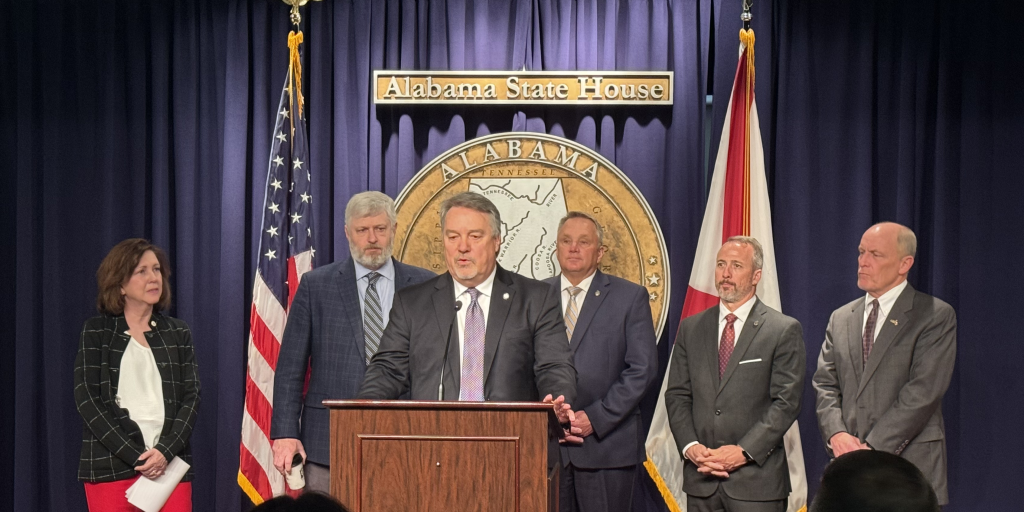MONTGOMERY — Alabama House Majority Leader Nathaniel Ledbetter (R-Rainsville) on Wednesday led other members of the House and Senate leadership in announcing a major legislative package designed to expand and improve the mental health services available to citizens of the state.
Leaders on hand on Wednesday included the majority and minority leaders in both chambers, as well as Lt. Governor Will Ainsworth (R-AL), Senate President Pro Tem Del Marsh (R-Anniston) and House Speaker Mac McCutcheon (R-Monrovia).
The mental health initiative is being undertaken at the personal request of Governor Kay Ivey, who highlighted the important issue during her 2020 State of the State Address earlier this month.
“Mental health affects every segment of our society, and it directly impacts important state government issues like public education, public safety, workforce development, economic expansion, public health, and others,” Ledbetter stated. “Addressing the mental health services offered by the state will give new hope and needed help to thousands of our fellow Alabamians and the friends and family members who love them.”
The package, which includes both Republicans and Democrats as sponsors, contains the following five pieces of legislation:
A School Service Coordinator Bill sponsored by Ledbetter and Sen. Rodger Smitherman (D-Birmingham) requires each school system within the state to employ a mental health service coordinator subject to legislative appropriation.
A 72-Hour Hold Bill sponsored by Rep. Wes Allen (R-Troy) and Sen. Donnie Chesteen (R-Geneva) authorizes law enforcement officers to place individuals who are believed to have mental illness and pose a threat to themselves or others under 72-hour protective custody, which invcludes transportation to a hospital for evaluation and treatment.
A CIT Training Bill sponsored by Rep. Rex Reynolds (R-Huntsville) and Sen. Andrew Jones (R-Centre) requires the Alabama Peace Officers Standards and Training Commission to provide mandatory crisis intervention training and continuing education to law enforcement officers.
A Crisis Care Center joint resolution by Rep. Randall Shedd (R-Fairview) and Sen. Garlan Gudger (R-Cullman) calls for the immediate creation and funding of three 24-hour crisis care centers, which serve as an alternative to costly hospital and emergency room visits by providing suicide prevention and other mental health services on an immediate, walk-in basis.
A Stepping Up joint resolution by House Minority Leader Anthony Daniels (D-Huntsville) and Sen. Steve Livingston (R- Scottsboro) encourages Alabama’s 67 counties to implement and embrace the Stepping Up initiative, which seeks to reduce the number of individuals in jail with mental illness.
Ainsworth said that providing additional access to mental health services will assist the state’s efforts to recruit new jobs, business and industries.
“Since taking office, I have focused my efforts on workforce development, and mental health is certainly an important factor in that area,” Ainsworth advised. “Providing a trained and qualified workforce to businesses that locate and expand here requires us to have workers who are both physically healthy and mentally healthy.”
McCutcheon added that addressing deficiencies in mental health access coincides with his ongoing desire to resolve long-neglected problems facing our state.
“The last time Alabama emphasized mental health services without a court order occurred in the 1960s when Lurleen Wallace passed a $43 million bond issue, which is equivalent to $300 million today,” McCutcheon remarked. “Just like the Legislature is addressing problems with our roads, bridges, and prisons, it is time to quit kicking the can down the road with regards to mental health.”
Marsh underlined the bi-partisan nature of the mental health effort.
“Studies estimate that one in four Americans suffer from a diagnosable mental health disorder, so simple math tells us that each one of us, whether we are aware or not, knows someone who is struggling,” Marsh outlined. “Mental health is not a Republican issue or a Democrat issue. It’s a simple issue of providing needed services that will help reduce recidivism in our prisons, improve performance in our schools, and enhance the quality of life for all Alabamians.”
Alabama Department of Mental Health Commissioner Lynn Beshear, an Ivey cabinet member, expressed appreciation that the legislative and executive branches of government are uniting their powers to address a growing problem.
“The fact that the governor and the Legislature are working so closely and cooperatively on this issues demonstrates its importance to Alabama and its citizens,” Beshear said. “The Alabama Department of Mental Health works hard to provide the best services possible with the dollars we are given, but this legislative initiative and intense emphasis will help us to literally save lives and provide hope where it does not currently exist.”
Sean Ross is the editor of Yellowhammer News. You can follow him on Twitter @sean_yhn













